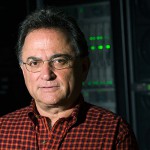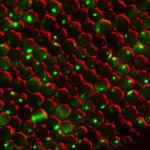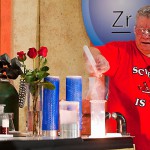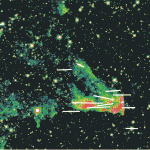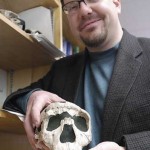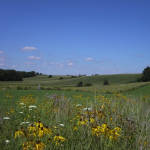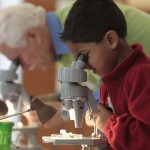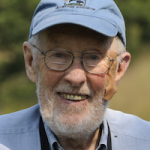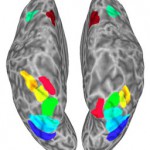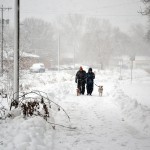Category Science & Technology
The chemistry of color: Energy researcher develops dye-based solar cells
University of Wisconsin–Madison researchers working at the intersection of basic and applied science focus on key factors like cost, environmental impacts ... and sometimes, color.
UW’s bug-eating advocate had global impact
When Gene DeFoliart had his brainstorm in 1974, not even he thought his brainchild would be an easy sell. As a professor at the University of Wisconsin–Madison, DeFoliart was focusing on how insects spread viral disease. Now he was captivated by an opposite proposition: using insects to foster human health — using them, to be specific, as food.
Miron Livny: Collaborative spirit supports Nobel Prize-winning science
In 1964, François Englert and Peter Higgs theorized the existence of a subatomic particle that gives all other particles mass. Nearly 50 years later in 2012, a global team of researchers found evidence that supports the existence of the Higgs boson particle at the Large Hadron Collider (LHC) in Geneva, Switzerland.
Physics Nobel awarded for Higgs particle; UW played key role in research
UW–Madison teams led by physicists Sau Lan Wu and Wesley Smith have played crucial roles in the development and operation of the two main experiments at the Large Hadron Collider (LHC) that discovered the Higgs boson in July 2012.
UW scientist sniffs out possible new tick species
In June 2012, Tony Goldberg returned from one of his frequent trips to Kibale National Park, an almost 500-square-mile forest in western Uganda where he studies how infectious diseases spread and evolve in the wild. But he didn’t return alone.
Zinc discovery may shed light on Parkinson’s, Alzheimer’s
Scientists at the University of Wisconsin–Madison have made a discovery that, if replicated in humans, suggests a shortage of zinc may contribute to diseases like Alzheimer's and Parkinson's, which have been linked to defective proteins clumping together in the brain.
UW-Madison chemist named ‘Friend of Education’
Bassam Shakhashiri, known far and wide for his annual holiday season exhibitions of chemistry, has been named a "Friend of Education" by the Wisconsin Department of Public Instruction.
Mouse studies reveal promising vitamin D-based treatment for MS
A diagnosis of multiple sclerosis (MS) is a hard lot. Patients typically get the diagnosis around age 30 after experiencing a series of neurological problems such as blurry vision, wobbly gait or a numb foot. From there, this neurodegenerative disease follows an unforgiving course.
UW veterinarians Nordlund, McGuirk win high honors from dairy industry
Early in October, the massive World Dairy Expo, perhaps the world’s largest trade show for dairy farmers, will make its 47th annual appearance in Wisconsin’s capital city — a clear indication of the state’s preeminence in the industry.
Students game the system, train computer to play Angry Birds
Angry Birds sounds simple: Just slingshot a digital bird at a pile of evil pigs. You could teach a child to play. But could you teach a computer?
Observations reveal critical interplay of interstellar dust, hydrogen
For astrophysicists, the interplay of hydrogen - the most common molecule in the universe - and the vast clouds of dust that fill the voids of interstellar space has been an intractable puzzle of stellar evolution.
John Hawks explores how celiac disease evolved
Celiac disease is an evolutionary paradox, says University of Wisconsin–Madison anthropologist John Hawks.
A shot of anxiety and the world stinks
Researchers using powerful new brain imaging technologies are revealing how anxiety or stress can rewire the brain, linking centers of emotion and olfactory processing, to make typically benign smells malodorous.
Marginal land in demand: researchers explore farmer willingness to grow energy crops
In their quest to make cellulosic biofuel a viable energy option, many researchers are looking to marginal lands - those unsuitable for growing food - as potential real estate for bioenergy crops. However, few people have asked: how do farmers feel about using their marginal lands for fuel production?
Wisconsin Science Festival features Nobel, Pulitzer Prize winners and NPR host
The Wisconsin Science Festival starts Sept. 26 with four jam-packed days, inviting people of all ages and interests to unleash their curiosity.
Decades on, bacterium’s discovery feted as paragon of basic science
Over time, the esoteric and sometimes downright strange quests of science have proven easy targets for politicians and others looking for perceived examples of waste in government - and a cheap headline.
Brain pathways tie together mental maps
To find its way in the world, your brain has to decipher a set of directions muddled by different points of view.
Researchers capture speedy chemical reaction in mid-stride
In synthetic chemistry, making the best possible use of the needed ingredients is key to optimizing high-quality production at the lowest possible cost.
UW-Madison alumnus wins major award for exploring chemistry of the nervous system
Richard Scheller, who graduated from the University of Wisconsin–Madison with a B.S. in biochemistry in 1974, has shared the 2013 Albert Lasker Award for Basic Medical Research for work explaining how messenger chemicals move between nerve cells.
Weather: More data + more computers = better forecasts
Been beefing about weather forecasts? Did the “experts” miss a thunderstorm, botch the rainfall prediction, mistake cloudy for sunny or windy for calm? You’re not alone. Forecasts of weather are already way better than forecasts of, say, unemployment or grain harvests, but that doesn’t lead us to predict that the caterwauling over weather forecasts will dampen.



